Elderberry syrup is an all-natural remedy for colds, flus, and other illnesses. It’s been used for centuries, and leverages the powerful antioxidant content in elderberries to boost the function of the immune system and lessen the severity and the duration of sickness.
There are a lot of different brands of elderberry syrup out there, and they vary in their potency, purity, and likelihood of being an effective way to help with illnesses.
We’ve ranked and reviewed the ten best elderberry syrups according to quality, plus taken a close look at the science behind using elderberry syrup to treat colds, flus, and other illnesses.
Research
Rankings
1. Essential Elements Elderberry Gummies
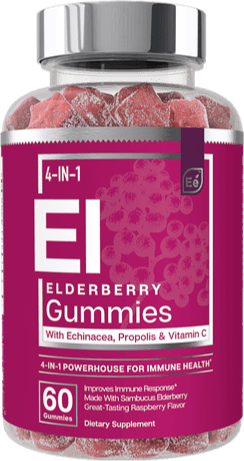
Essential Elements provides a powerful immune-boosting gummy with four powerful ingredients: vitamin C, black elderberries, echinacea, and propolis. These antioxidant-rich compounds combine to support the body in times of stress, reducing the likelihood of colds and flu.
There are no fillers, additives, or unnecessary coloring agents, and each gummy comes in a delicious raspberry flavor. Without a doubt, BodyNutrition’s #1 recommended elderberry supplement.
2. Nature’s Way Original Sambucus Elderberry Syrup
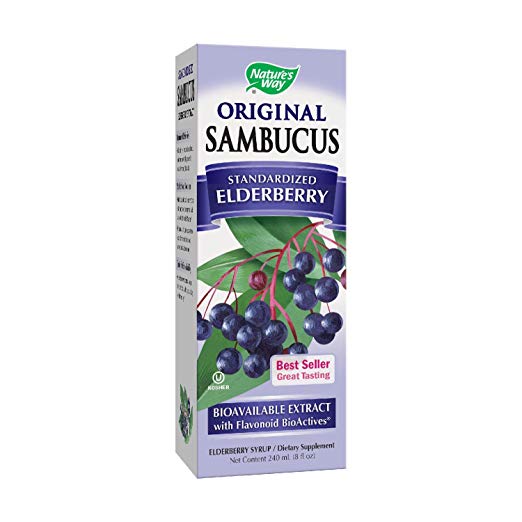
Nature’s Way makes an incredibly popular elderberry syrup that’s pretty simple and straightforward in its ingredients.
Each 10 mL serving contains 100 mg of black elderberry extract, which provides the equivalent of 6.4 grams of raw elderberry fruit. The excellent elderberry dosage makes it our number one choice.
3. Gaia Herbs Black Elderberry Syrup
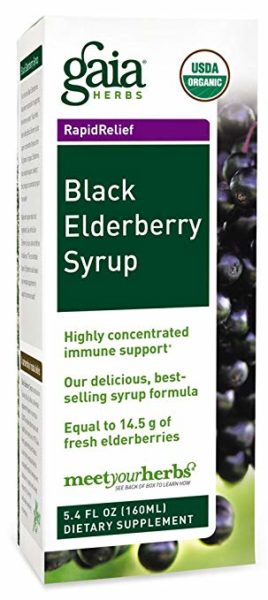
Gaia Herbs Black Elderberry Syrup delivers a super-potent black elderberry juice concentrate, with added antioxidant power from acerola cherry extract.
It’s flavored with sugarcane, providing eight grams of sugar per 10 mL of liquid. Both the elderberry and the acerola cherry are organically grown, making this a great choice if purity is important to you.
4. NOW Foods Elderberry Liquid
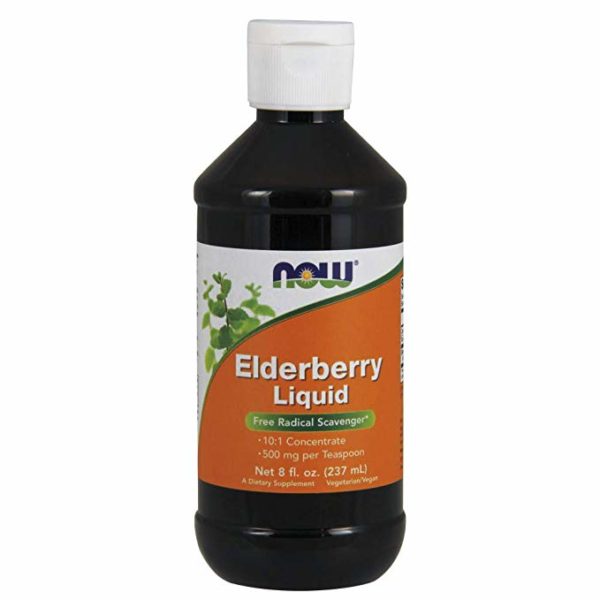
NOW Foods Elderberry Liquid provides a simple but powerful elderberry syrup supplement. Its elderberry content is among the highest on the market, thanks in part to its lack of any added sugar.
While it’s not as sweet as some other options, which might make it less palatable to kids, the low sugar content is great from a health perspective. If you want a straightforward and potent elderberry syrup, this should be your choice.
5. Elderberry Queen Organic Elderberry Syrup
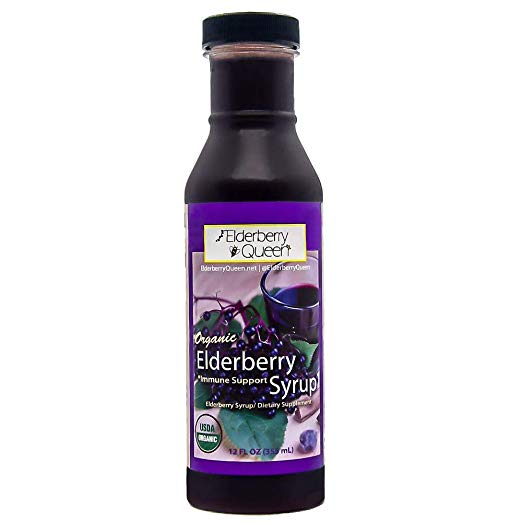
‘Elderberry Queen makes an organically certified elderberry syrup that incorporates both black elderberry fruit juice concentrate and aronia berry extract for added antioxidant power.
The sugar content is among the lowest on the market, at only 3 grams. Because the syrup is a blend of both elderberry and aronia berry, the elderberry content is lower than average, but it’s still unique among the blended elderberry syrups for its organic certification.
6. Garden of Life Elderberry Immune Syrup
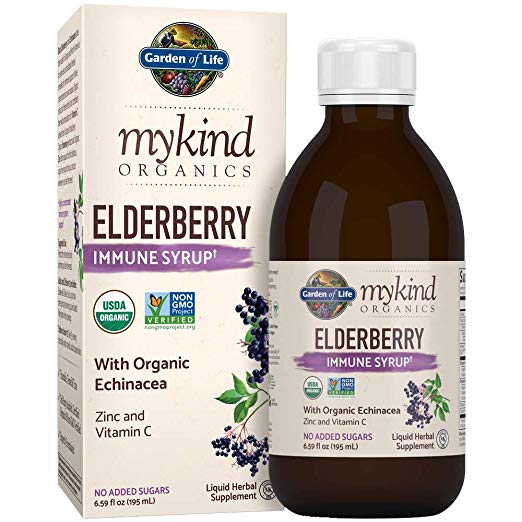
Garden of Life Elderberry Immune Syrup uses a blend of elderberry juice and elderberry extract in conjunction with a proprietary blend of aronia berry and other herbal extracts to boost immune function.
It uses tapioca fiber syrup instead of sugar as a sweetener, so it has zero grams of sugar, and even a bit of fiber. Though its dosage of elderberry isn’t the highest on the market, it’s one of the better blended elderberry syrups.
7. Honey Gardens Elderberry Syrup
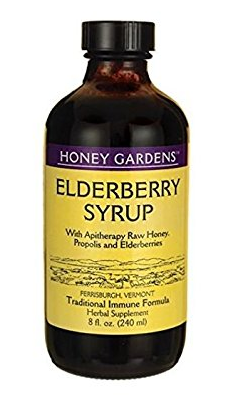
Honey Gardens Elderberry Syrup uses a unique blend of several herbal ingredients designed to reduce the severity of illnesses: it has elderberry syrup, plus raw honey, apple cider vinegar, propolis from honey bees, and echinacea.
Because of these additional ingredients, it’s dissolved in a fairly high concentration of alcohol and water, which might make it a poor choice for children.
That aside, Honey Gardens Elderberry Syrup provides a high quality arsenal of herbal ingredients to treat colds and flus, making it a good pick if you want to use elderberry in conjunction with other remedies.
8. Maine Medicinals Elderberry Syrup
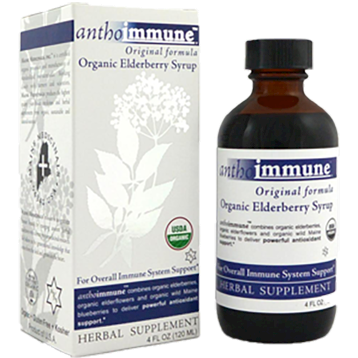
Maine Medicinals Elderberry Syrup is another blended elderberry syrup that includes two varieties (American and European) of elderberry alongside blueberry and elderflower extract.
As with other blended elderberry syrups, the elderberry content proper is lower than what you’d get in a syrup that only uses elderberry juice or extract.
The potential benefit is the added immune function provided by these additional antioxidants, so what style of elderberry syrup you choose will depend on your supplementation strategy.
9. Sambucol Black Elderberry
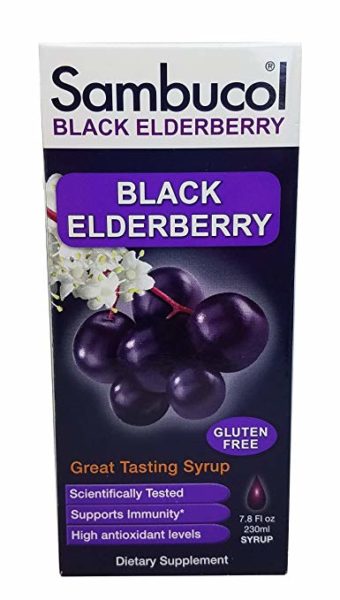
Sambucol Black Elderberry is a long-standing favorite when it comes to elderberry syrup. Its simple formula, consisting of 3.8 grams of elderberry extract per serving and glucose syrup as flavoring, makes it a very simply designed supplement.
However, it has a few preservatives added, and its elderberry content isn’t quite as high as some of its other competitors, which knocks it down a few points in the rankings.
10. Nature’s Way Original Sambucus for Kids
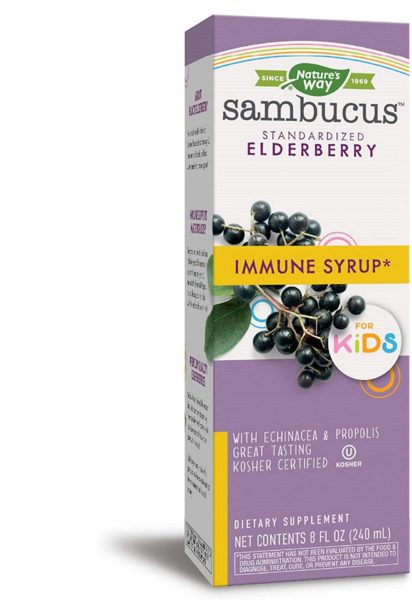
Nature’s Way Original Sambucus for Kids contains a blend of both elderberry and echinacea, blended with honey bee propolis.
This liquid herbal remedy uses multiple ingredients for a better chance at reducing the severity of illnesses.
Even though it’s flavored with both fructose and natural flavoring agents, the sugar content is not too high, at five grams per 10 mL.
It’s a decent choice, though the primary drawback is the elderberry content, which is necessarily lower due to the inclusion of the other herbal ingredients.
11. JoySpring Elderberry Blend

JoySpring Elderberry Blend is an elderberry syrup that’s specifically made for kids. It is sugar-free and uses a proprietary blend of elderberry alongside other herbal ingredients like mullein leaf, marshmallow root, angelica root, orange peel, and calendula flower.
Unfortunately, since these ingredients are all included as a part of the proprietary blend, it’s hard to tell how the dosage compares to other products on the market.
Given the sheer number of compounds, and the dosage of the proprietary blend as a whole, it’s clear that the dose of elderberry itself is quite low.
Category winners
Best elderberry syrup overall: Essential Elements Elderberry Gummies
Essential Elements takes our top stop thanks to its innovative formulation that combines elderberry alongside echinacea, vitamin C, and propolis. For an all-purpose sickness remedy, it’s a fantastic first option.
Best elderberry syrup for kids: Gaia Herbs Black Elderberry Syrup
With all-natural and organically-sourced ingredients, Gaia Herbs is a great pick for kids. The sweetness added with a small amount of sugar and lemon will make it go down easy, and thanks to the organic certification, you know the purity is top-notch.
Best liquid elderberry syrup: Nature’s Way Original Sambucus Elderberry Syrup
Super-pure and free from added sugars or preservatives, Nature’s Way is our top pick for liquid elderberry syrup thanks to its simple and high-quality formulation.
Best gummy elderberry syrup: Essential Elements Elderberry Gummies
Delivering elderberry in a no-mess easy-to-take gummy form, Essential Elements is our favorite when it comes to gummy elderberry syrup. Add to that its other ingredients, including echinacea and vitamin C, and it’s perfect for stashing in your purse or at your desk at work.
Best elderberry syrup for the cold: Nature’s Way Original Sambucus Elderberry Syrup
Nature’s Way liquid elderberry syrup is perfect for the cold. Taken alone, or when mixed into a hot beverage like tea, it can go a long way towards soothing a sore throat, cough, and aches and pains.
Best elderberry syrup elderberry syrup with echinacea: Essential Elements Elderberry Gummies
Echinacea is a prairie plant that’s long been used as an herbal remedy for the cold and the flu. Essential Elements combines echinacea with elderberry syrup for powerful anti-illness effects.
Who should buy elderberry syrup?
Elderberry syrup is a popular remedy for treating or preventing illnesses like the common cold or the flu. Elderberry is a fruit that contains powerful antioxidants which are thought to help your body fight off or recover from viral illnesses.
Elderberry syrup is a sweet and tasty way to recover faster from illnesses, and at least preliminary evidence exists supporting its use against both the common cold and the flu. More promising evidence supports elderberry syrup for reducing the duration of illness following air travel, too.
When you travel on a plane, you spend long periods in close proximity to a lot of other people, so your exposure level to germs is a lot higher than it usually is. Further, when you change time zones, your body’s ability to fight off infection is diminished.
Taking elderberry syrup before or after travelling could be a good way to boost your chances of staying healthy during your trip, or recovering from illness if you come down with one.
Just based on exposure, elderberry syrup is a better idea in the wintertime, since colds and the flu become much more common (likely the result of people spending a lot more time indoors in close proximity, and not necessarily a result of colder temperatures directly).
Finally, elderberry syrup might be a good supplement for people looking to boost their overall antioxidant levels: it’s known to have strong antioxidant abilities, and is derived from a natural berry, which makes it quite safe.
How we ranked
Two factors dominated when we were formulating our rankings of the best elderberry syrup on the market: elderberry content and the quality of the source of elderberries used in the formulation.
For the content, we were looking for dosages that lined up with what’s been studied experimentally. Studies have looked at anywhere from under one gram to 12 grams of raw elderberry material per day, but we strove for doses in the upper half of this range: six grams of raw elderberry equivalent per serving or more, if possible.
While not all elderberry syrup products are clear about the concentration of elderberry material in the liquid, those that were (and that had high concentrations) scored highly.
We were also concerned with the quality of the elderberries: indicators like an organic certification, which we found in some of the top brands, were a great sign that a company was committed to ensuring that their elderberries were from a high quality source.
On the topic of quality and purity, our research team also examined the other ingredients in each product. Elderberry syrup, as the name suggests, is sweetened, but we wanted to exclude products that were too sugary. We rewarded products with attractively low sugar content, or that used other natural but non-caloric sweeteners like stevia.
We also excluded products with artificial flavors and colors that detract from the usefulness of the product: since elderberry syrup is a natural remedy, any extraneous ingredients detract from the formulation.
Lastly, we considered a few peripheral concerns, like the quality of the bottle itself. While this plays only a minor role in the effectiveness of elderberry syrup, like other antioxidants, elderberry syrup is vulnerable to light and oxygen.
So, the ideal container is one that is opaque and has a solid airtight seal, while still being easy to pour and easy to use. While this only had minor effects on the overall score, it did lead to a few changes in our final rankings.
The remaining products, sorted according to overall quality, represent the best selection of elderberry syrups available now.
Benefits
Elderberry syrup is a dark purple liquid that’s long been used as an herbal remedy for illnesses like the cold or the flu.
Elderberry syrup contains powerful antioxidants, which are thought to be responsible for the blunting effect that elderberry syrup has on sicknesses.
By enhancing the body’s immune system response, the duration and severity of colds and flus could be reduced. We’ll take a look at the science behind elderberry syrup as well as its potential for side effects.
Benefits
Elderberry syrup can fight both bacterial and viral infections. The strong antioxidant powers of elderberry appear to have both antibacterial and antiviral properties, making it well-suited for fighting off infections.
A scientific study published in 2011 in the journal BMC Complementary and Alternative Medicine used biologically active cultures of influenza viruses and bacterial agents responsible for upper respiratory tract infections (1).
By testing the responses of the viruses and bacteria to various concentrations of elderberry juice extract, the researchers were able to demonstrate that the elderberry juice extracts exhibited strong antimicrobial activity, providing good scientific support for its capabilities as an anti-illness remedy.
The next step was to test the activity of elderberry inside actual living cells.
Elderberry contains compounds that fight the flu in living cells. Other research suggests that these antimicrobial properties do indeed carry over to living cells.
A paper published in The Journal of Alternative and Complementary Medicine tested how well a standardized extract of elderberry juice inhibited the growth of several different strains of influenza virus (2).
The study used cells from pigs and turkeys in one experiment, and were able to show that exposure to elderberry inhibited several different strains of the influenza virus.
Moreover, in a secondary experiment, the researchers documented how elderberry syrup was used to treat an outbreak of a serious form of influenza in an agricultural community in Israel, and noted that fever and feelings of illness decreased rapidly after administering elderberry syrup.
This secondary study used both a placebo group and an experimental group that took real elderberry syrup; the placebo group recovered from the flu in approximately six days, while the elderberry group recovered in only two to three days.
Elderberry syrup can also help you recover from the cold. While one group of viruses causes the flu, a completely different type of virus causes the common cold.
Fortunately, research suggests that these “rhinoviruses” which cause upper respiratory infections, such as the common cold, are also amenable to being treated with elderberry syrup.
A paper published in 2016 in the journal Nutrients by a team of researchers in Australia studied over 300 airline passengers (3). The passengers were randomly assigned either a placebo supplement or an elderberry supplement, and the researchers tracked who became ill and how long their illness lasted.
The results showed that, of those participants who got a cold, those who were taking the elderberry supplement had significantly fewer days lost to illness compared to the placebo group.
This agrees with the research we reviewed earlier, which found that elderberry was effective at inhibiting the growth of a wide variety of viruses and bacteria.
This is why you’ll find elderberry extract included in multi-ingredient remedies for illness that take advantage of its broad spectrum antimicrobial activity alongside other herbal remedies for sickness like echinacea.
The antioxidant powers of elderberry syrup can help improve long-term health too. With many of the antimicrobial properties of elderberry syrup being attributed to its strong antioxidant abilities, it’s natural to wonder if it shares the same health benefits of other potent antioxidants like resveratrol and astaxanthin.
A review article published in the Journal of Functional Foods in 2015 by researchers in Poland suggests that many of the same benefits do apply (4).
For example, the researchers cite scientific papers demonstrating that elderberry can reduce oxidative stress and reduce a number of risk factors for cardiovascular disease.
These benefits likely have to do with the ability of any antioxidant to reduce oxidative stress, which causes measurable damage to arteries (among other bodily structures).
Elderberries are an excellent and highly bioavailable source of anthocyanins. Anthocyanins are powerful antioxidant agents found in a wide variety of plants, ranging from everything from blueberries, raspberries, and blackberries.
They’re thought to contribute strongly to the antioxidant powers of many fruits, and they’re found in high concentrations in elderberry syrup.
A study published in 2004 in the International Journal of Clinical Pharmacology and Therapeutics examined the bioavailability of anthocyanins in elderberry extract and compared it to the bioavailability of anthocyanins in blackcurrants, another rich source of anthocyanins (5).
The researchers studied how blood levels of anthocyanins changed during the hours following consumption of a standardized amount of the extract from each kind of berry. They found that only 0.37% of the administered dose of anthocyanins was excreted in urine within seven hours following consumption of the extract, meaning that most of the bioactive compounds were still circulating or being processed by the body.
Moreover, the researchers found that anthocyanin absorption was five to six times greater following consumption of elderberry extract compared to blackcurrant extract. The results did show that the body breaks down the anthocyanins in elderberry juice fairly quickly, though: half the administered dose is processed out of the blood after 1.74 hours.
Sometimes results like these are interpreted to mean that a supplement should be split up into multiple daily doses, though going this far with results so preliminary is probably not wise. It’s not clear if all of the benefit of elderberry syrup is attributable to anthocyanins; since research in humans so far has used only one dose per day, it’s probably wiser to stick to this dosage level.
Nevertheless, this pharmacological study does provide some support for future research into the potential benefits of multiple smaller doses of elderberry syrup throughout the day, as opposed to one larger dose once per day.
Side effects
While the elderberry is safe to eat, unripe elderberry fruit and the other parts of the plant contain toxins. Elderberry syrup poses a risk of nausea and vomiting, but only if you are using a homemade version that inadvertently included some unripe elderberries.
Processed versions use only ripe and nontoxic elderberry fruit. Animal studies have found that elderberry syrup is quite safe, though because its biological mechanism of action is not well-characterized, it is not recommended for pregnant or lactating women (6).
Moreover, as with any supplement, it’s a good idea to talk to your doctor if you take prescription medications that might interact with supplements that you are taking.
Recommended dose
Establishing precise dosing guidelines for elderberry syrup is a challenge, because many different studies have used many different doses.
Still, one review study cites doses ranging from an equivalent of 0.2 to 12 grams of actual elderberry fruit used as a dose, with the most common doses in the vicinity of three grams (7).
In most elderberry syrup formulations, this works out to 5-15 mL of liquid taken once or twice per day. As with other treatments for infections, like cough drops and zinc supplements, it’s best to take elderberry syrup at the first sign of any symptoms of illness, versus waiting until your symptoms get worse.
That way, you have the best chance of alleviating your symptoms and reducing the duration of illness as much as possible.
FAQ
Q: What is an elderberry?
A: The elderberry is a small black berry that grows on a tall, flowering bush that grows in temperate regions throughout the world. The berries are unusual among berries in that they need to be cooked in order to be eaten.
Uncooked elderberries, eaten in large enough quantities, can cause nausea, vomiting, and diarrhea because of toxic compounds contained in the raw berries. Once cooked, they’re a rich source of antioxidants, and the toxic compounds are destroyed.
Q: How do you make elderberry syrup?
A: You can make your own elderberry syrup at home using dried elderberries, a bit of sugar, and some spices like clove and cinnamon.
The elderberries must be boiled in water for a good hour or so to neutralize the toxic compounds found in the raw plant material, though.
For most people, the mess and the difficulty of making elderberry syrup at home isn’t worth it—you need to make sure that you don’t accidentally poison yourself by undercooking the elderberries, and you also need to use it within a few weeks; otherwise, without any preserving agents, it will go bad.
Q: Can you take elderberry syrup daily?
A: While research on long-term use of elderberry syrup in humans is limited, animal research suggests that elderberry syrup is quite safe (8).
Using elderberry syrup daily might get expensive, so many people limit its use for when they start coming down with symptoms of the cold or symptoms of the flu.
To date, the best-supported use of elderberry syrup is for shortening the duration of illnesses acquired during or right after travel. If you have a trip coming up, start taking elderberry syrup daily a few days out from the trip, and continue taking it for at least four days following your trip.
Q: Is elderberry syrup good for colds?
A: Since elderberry syrup is thought to help with infections, the common cold is at the top of the list of potential things it can be used to treat.
Based on a limited amount of research, the best strategy seems to be to start taking elderberry syrup as soon after you start feeling symptoms as possible. Ideally you’d even be taking it before you start feeling symptoms, but of course you can’t tell when you’re going to get sick until you start feeling symptoms!
In this sense, elderberry syrup is much like cough drops that deliver zinc to your throat. If the preliminary research that’s been done on elderberry syrup is correct, this sort of strategy should speed your recovery from a cold by up to 50%.
This means it’s definitely worth a shot if you can get some as soon as you start developing symptoms.
Q: Is elderberry syrup good for kids?
A: Based on the scientific research, it’s very hard to make any specific recommendations on whether elderberry syrup should be used in children.
The amount of work that’s been done on adults is very limited; when it comes to kids, there are no scientific studies on the effectiveness or the safety of elderberry syrup.
Now, that hasn’t prevented elderberry syrup from being a popular home remedy that’s been used by children all over the world, but just because something has been used does not guarantee its safety or efficacy.
Q: Can elderberry syrup help with the flu?
A: Elderberry syrup’s mechanism of action is not well-understood, but based on results from lab work, elderberry syrup should, in theory, be effective against the flu virus as well.
A small clinical trial published in 2004 suggests that elderberry syrup may speed recovery from the flu, too (9). In the study, a series of 60 people who had been suffering from the symptoms of the flu for 48 hours or less were given either a placebo or 15 mL of elderberry syrup.
The results showed that the patients given the elderberry syrup recovered four days earlier than the patients who took the placebo.
Looking at both this research and the research done on the common cold, these results suggest that elderberry syrup could be contributing to a generally faster rate of recovery from infections, which includes the flu.
Q: What is elderberry syrup?
A: Elderberry syrup is made by taking an extract of the elderberry and mixing it with water, sugar or another sweetener, and occasionally some other herbs and spices, like cinnamon, ginger, lemon, or clove.
The elderberry extract itself is made by cooking elderberries to remove the toxins in the raw plant material (usually by boiling them), then concentrating the dark reddish-purple liquid that results and straining off the solid material, which includes the elderberry fiber and seeds. This extract contains the biologically active compounds, including the anthocyanins and other antioxidants.
Sugar (or other non-caloric sweeteners) both help make the taste palatable, and help prevent bacterial growth in the liquid.
By making the syrup very concentrated, it’s quite difficult for bacteria to reproduce–this is the same principle that is operating when honey stays good for a long time without any additional preservatives.
Q: How long does elderberry syrup last?
A: All commercially available elderberry syrup should come with an expiration date, and thanks to modern pasteurization and sealing technology, an unopened bottle should stay good for over a year.
Once open, elderberry syrup should be used within three months. Store elderberry syrup that’s been opened in the refrigerator to prolong its shelf life: heat, oxygen, and light are the enemies of strong antioxidants like elderberry, so the fridge will help keep elderberry syrup good for as long as possible.
The fridge storage guideline also applies to homemade elderberry syrup, though it may not hit the shelf life of three months that commercially available elderberry syrup can make.
Commercially available elderberry syrups tend to be very concentrated, which helps inhibit bacterial growth. Some also contain preservatives, though you may not want one with preservatives if you’re looking for an all-natural product.
Q: What does elderberry syrup taste like?
A: Elderberry syrup has a sweet and earthy complex taste, but it’s surprisingly mild for something so dark-colored and concentrated.
The sweetness of elderberry syrup is mostly dictated by how much sugar or other sweetener is added to the syrup, as the elderberry itself is not particularly sweet.
If you’re expecting a flavor similar to blueberries, blackberries, cherries, or other dark-colored fruits, you’ll be quite surprised at the difference between the flavor of elderberries and the flavor of these sweeter, tarter, tangier fruits.
Related articles
Recap
Elderberry syrup is an herbal remedy for illnesses that has a strong body of scientific evidence supporting its use as a treatment for the cold and the flu.
Moreover, it might also help with reducing oxidative stress and reducing your risk for heart disease. It exhibits strong antibacterial and antiviral activity, probably due to its high antioxidant content.
Though it’s not a complete cure for the cold or the flu, it’s been shown to reduce the duration and severity of symptoms of mild infections when taken at appropriate doses—starting at about three grams of elderberry fruit equivalent seems to be the most common dosage used in the scientific literature.
With a high-quality elderberry syrup, the risk for side effects is very low, and there’s good evidence to believe that elderberry syrup can help alleviate symptoms and reduce the duration of illnesses like the common cold and even the flu.
For BodyNutrition‘s #1 elderberry syrup recommendation, click here.